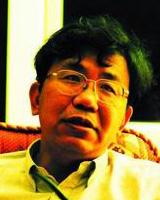|
Zhu Xueqin: Harmony stems from democracy
By Zhu Xueqin/Enclavetj (mranti.blogneo.com)
Updated: 2005-12-02 09:10 Zhu Xueqin is a professor in the
Department of History at Shanghai University. He wrote an essay in China
Newsweek, Dec 23th 2004, discussing the popular phrase: "being people oriented."

Zhu Xueqin
[sina/file] | Modernity brings stability while modernization produces instability.
Sociology is even more specific about this: when the per capita GDP of a
developing country reaches a zone of USD 800 to 1000, unstable times come as
interests differentiate and even conflict.
Statistics show that China crossed this threshold in 2004, so from this point
of view, people should not be too surprised to read a series of news stories,
from the torrent of "Letters and Complaints" to endless riots in Mid-west China
this year.
The Chinese ship has sailed into unknown waters full of submerged reefs.
Social development has entered a high risk zone. It indicates that "reform and
opening" is still in progress. Meanwhile it gives us a test: are we wise enough
to transform conflicts into harmony?
錕斤拷錕斤拷
With 2000 years of feudal
traditions, 150 years of anti-aggression struggles and 30 years of "class
warfare," fractious nature runs deep in our society. In a small town in
southwest China, just an arrogant word triggered people's anger and soon
developed into a street riot.
Fortunately, the local government dealt with it "flexibly" and finally public
anger was appeased. If the example proves that modernization brings instability,
the "flexible strategy" may amount to a kind of political progress in China.
And only in this way can the CPC change itself from a revolutionary party to
a governing one. Only on this condition can a harmonious society be achieved
with a soft landing.
錕斤拷
However, not all officials can understand or accept
the "flexible strategy" right now. In other places, officials are anxious to
find representatives of the people to have dialogue with, but when the riot
comes to an end, they simply retaliate against them, making it seem like
"official anger" cannot be appeased without arresting somebody.
Taking revenge can prevail for a while, but in the long run it will only
silence dissent and make accumulated rancor grow. Once the silence is broken,
what's sacrificed is the harmony.
錕斤拷錕斤拷
History has taught us that the key
factors that disrupt harmony come not from the outside world, but from some
officials' distrust of the public. China has to erase "self-demonization" (when
encountering conflicts, choosing to suppress them rather than settle them
through the law.) from the inside if it hopes to refuse "demonization of China"
by the outside world.
China has "opened and reformed" for 25 years. Profound change has also taken
place as "open" society gradually has demanded deeper "reform." Every industry
is checking what it has gained after China joined the WTO, and international
reactions seem positive.
But don't forget that when China's economy tries to meet the standards of the
WTO, other aspects of the country should too. The Chinese government has
subscribed to both the "International Covenant on Civil and Political Rights"
and the "International Covenant on Economic, Social and Cultural Rights." These
are both tests of the government's credibility. If we can ensure people's
political rights as we do economic development, recognition of China's market
economic status might have better results.
錕斤拷
Not only does "openness"
demand "reform," but "democratic knowledge" demands "democracy." The more that
people have the right to know, the more they demand democracy.
A society without transparency is blind, for anything could happen, or not
happen. We have some good examples, but that's not enough. "Informing people
about everything that matters" is a fundamental guarantee of modern harmony.
"Modern harmony" is based on democracy while "ancient harmony" simply meant
silence on the surface. That is the difference. Nowadays, harmony survives by
undertaking democracy, and seeking "harmony" through suppressing dissent kills
harmony along with democracy.
Harmony doesn't mean having uniform interests, but knowing how to deal with
different interests in a democratic way to avoid a zero-sum game. People should
recognize that "all the people of one mind" at the beginning of China's opening
period has ended, replaced by a more diverse society with various interests. The
key issue is not who demands equality or who does not, but rather to understand
why the society is so unfair and how to change it.
錕斤拷
We believe the
market economy is not a sin. On the contrary, the sin comes from inequality of
non-economic rights. It is this inequality of rights that distorts China's
market economy, and that also leads to omnipresent corruption and peasant
problems in China.
錕斤拷
We have missed many opportunities to cope with these
problems at a lower cost over the past 25 years. Still, we oppose irresponsible
tendencies for violent revolution on the grounds that they simply mean
replacement [of the current system] by another kind of inequality.
The reason we can be cautiously optimistic is that the "open and reform"
policy keeps going forward despite some twists and turns. Our progressing
society has even produced some innovation itself.
In the province of Zhejiang, workers negotiated collectively with their
employers; in Yinchuan, a cab driver strike ended with an unusual compromise by
the government. Also, in the Nujiang river and the Tiger Leaping gorge, the
power of NGOs has begun to emerge in the controversial issues of dam-building.
錕斤拷
Talking about "being people oriented" seems rather popular this year.
However, that depends on people's participation in economic, cultural and
political activities. Only in this way, can "being people oriented" be
effective.
|